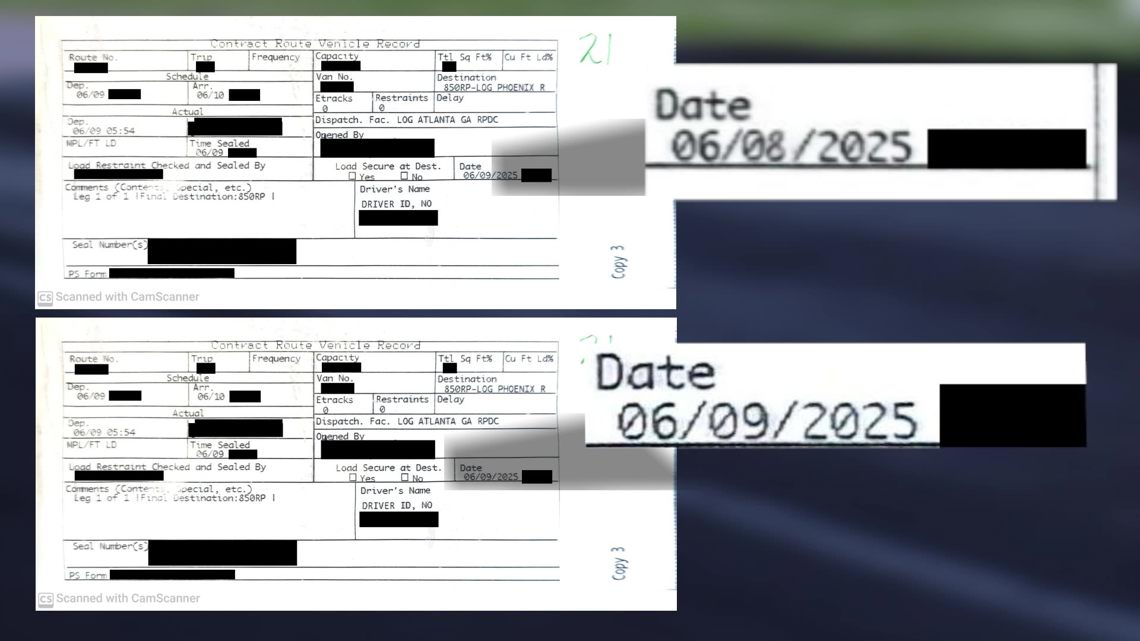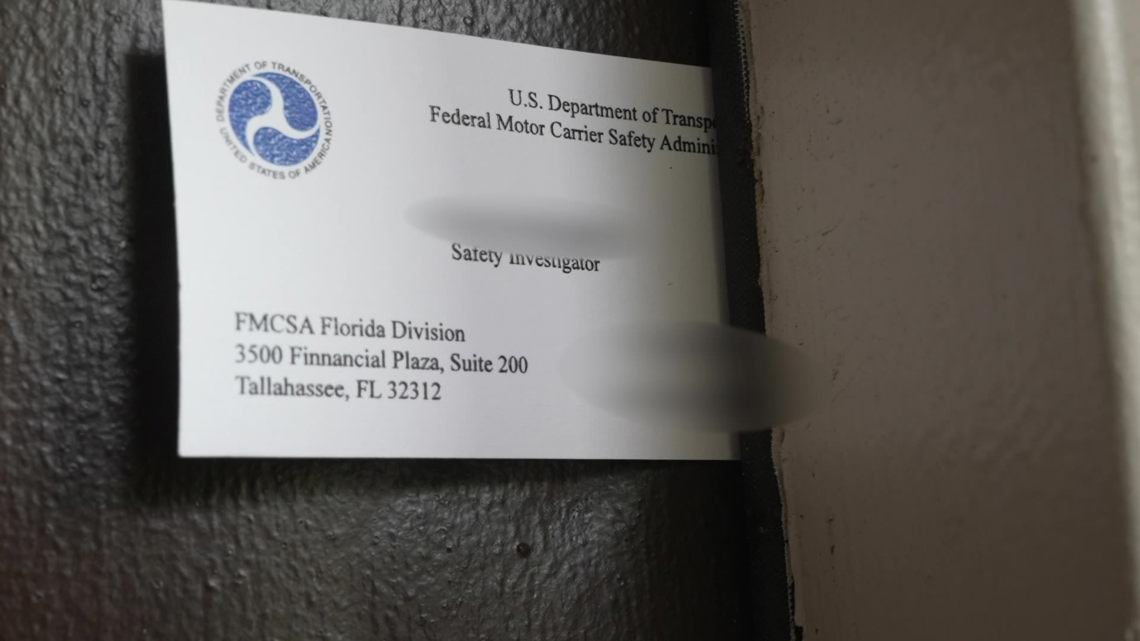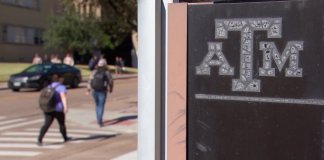Sources tell WFAA the truck’s registration was falsified, and arrest warrants have been issued as the company behind it faces scrutiny.
DALLAS — DNP until Tanya’s written approval
The truck that slammed into two cars in Terrell, killing five people — including four from the same family — was hauling a U.S. Postal Service load that began its journey 800 miles away in Atlanta, a WFAA investigation has found.
The driver, Alexis Osmani Gonzalez-Companioni, told police he fell asleep and “woke up to a loud bang.”
Sources familiar with the investigation said the truck’s registration, known as a “cab card,” was falsified. Arrest warrants have been issued in connection with the fake registration, though it remains unclear how many were issued or who they name.
Hope Trans LLC, the company the driver worked for, has a troubling safety record, federal records show. It’s been repeatedly cited for drivers exceeding legal hours. Two former drivers told WFAA the company routinely backdated shipping documents to skirt federal fatigue rules.
“The whole family died needlessly,” said attorney John Nohinek, who represents one of the victims’ relatives. “There are so many issues with the company… It’s a matter of time before this happens.”
U.S. Postal Service policy requires two operators in the truck cab, known as team drivers, for trips more than 500 miles. Records show the truck involved in the June 28 crash only had one driver.
Hope Trans had been hired to move the load by Covenant Transport Solutions, a subsidiary of Covenant Logistics, a Tennessee-based company with more than $40 million in Postal Service contracts.
The crash raises serious questions about how a driver working for a company with a troubled safety record ended up hauling a U.S. Postal Service load—alone—on a trip that should have required a team.
Hope Trans has not responded to repeated calls or emails for comment.
‘I need coffee’
A former Hope Trans driver told WFAA he drove a postal load from Atlanta to Phoenix solo just weeks before the crash.
“I next-day shipped it… off of three hours of sleep,” he said.
Federal law limits truckers to 11 hours of driving per day, followed by a 10-hour rest. But the driver said Hope Trans regularly backdated shipping documents to skirt those rules. He provided a bill of lading showing a falsified departure date.
“They change the pickup times… push the times back if you need more time,” he said.

Roughly a week before the crash, he said he contacted Covenant and alerted an official managing Hope Trans loads.
“I told him I was the only one running that load,” he said. “He just kind of brushed it off.”
Another former driver shared a similar account, providing WFAA with paperwork for a 2,200-mile haul from North Carolina to Utah with another backdated bill of lading.
“They (Hope Trans) don’t care about rules,” he said. “They just care about dropping off the load and making that money.”
He said Hope Trans dispatchers used coded language to conceal log violations. In his case, “coffee” was the code word.
He shared what he said were messages sent over the Telegram app:
Trucker: “I need coffee.”
Dispatcher: “You mean time? Hours?”
Trucker: “Yes.”


He provided records showing he sent in the original bill of lading, and Hope Trans dispatchers sent back the backdated one.
Both drivers provided WFAA with identical messages instructing them to hide the original shipping documents and a warning that showing them to the authorities “can lead to a major violation.”
“If Hope was doing that,” said Nohinek, the attorney representing one of the victims’ family members, “they for sure didn’t belong on the road.”
A ‘severe risk’
Steve Bryan, CEO of Bluewire, a trucking safety analytics firm, said Hope Trans scored a 50.25 out of 100, which Bluewire classifies as a “severe risk.”
“They also have multiple failures in a category we call safety culture,” Bryan said.
Bluewire functions like a credit reporting system for trucking companies, analyzing crash and inspection data for more than 700,000 carriers nationwide and scoring them. Hope Trans changed ownership in 2023, and that’s when its Bluewire score began to slide.
“All of their behavior measured by inspections, violations, crashes started… plummeting,” Bryan said.
According to federal inspection data collected by Bluewire, the Postal Service was one of Hope Trans’ top customers—whether the agency knew it or not.
A 2024 audit by the U.S. Postal Service Office of Inspector General found the agency “did not always know who was authorized to transport the mail on its behalf.”
That’s largely because the Postal Service uses brokers, who hire trucking companies to haul the loads.
That same audit revealed the Postal Service failed to track accidents and fatalities involving its trucking contractors. Between 2018 and 2022, contract drivers were involved in at least 373 crashes that killed 89 people.
The audit also uncovered widespread failures in vetting drivers and monitoring subcontractors. Postal policy requires team drivers for trips more than 500 miles, but the audit found no mechanism to enforce that requirement.
In response to the audit, USPS agreed to monitor crashes and fatalities going forward. But it rejected calls to create a mechanism verifying the use of team drivers, saying those responsibilities fall on brokers, not the agency.
The inspector general disagreed, warning that a lack of oversight could result in “potentially unqualified drivers transporting mail, compromising the security of mail and the safety of motorists.”
Covenant, the company that hired Hope Trans to haul the U.S.P.S. load, said in a statement it was “deeply saddened” by the crash and is cooperating with “all law enforcement and other governmental agencies investigating this incident.”
The Postal Service also issued a statement saying contractors are “required to comply with all applicable state and federal laws,” and that the crash remains under investigation.
Both declined to answer detailed questions.


A coworking space for a trucking company?
At the time of the crash, federal records listed Hope Trans’ address as a coworking space in Tacoma, Washington. But staff there told WFAA’s content partner, KING 5, that the company only received mail at that location and had no physical presence.
Under federal law, trucking companies must list a “principal place of business”—a physical site where safety records are kept and federal inspectors can visit.
Days after the crash, Hope Trans changed its address to an apartment in Orlando, Florida. When WFAA’s sister station, WTSP, knocked on the door, no one answered—but the business card of an investigator with the Federal Motor Carrier Safety Administration, or FMCSA, was wedged in the doorframe.
A neighbor said she had never seen any trucking activity at the apartment.
Both former Hope Trans drivers who talked to WFAA said they were flown into Orlando from out of state and sent to an office that wasn’t listed in Hope Trans’ federal records. The sign on the door was for a different trucking company.
“There were maybe two to four people in there,” the first trucker said. “It was disorganized. Looked like they’d just moved in or were fixing to move out.”
They were later sent to pick up trucks from a nearby yard, trucks they say were unsafe.
“The sticker was out of date. Their equipment was rusty and noncompliant,” the second trucker said.
Both said they quit within weeks.
“If I’d kept driving for this company,” the second driver said, “I was gonna end up just like that driver did.”
Gonzalez-Companioni, the driver in the Terrell crash, faces five counts of manslaughter and four counts of aggravated assault with a deadly weapon. A grand jury is expected to hear the case Friday.
The company remains authorized to haul freight on U.S. highways.
Got a tip? Tell us here or email investigates@wfaa.com
Great Job & the Team @ WFAA RSS Feed: news Source link for sharing this story.





